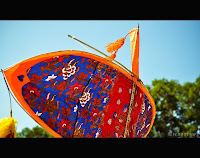CONGKAK
Congkak(Congklak) is a mancala game
of Malay origin played in Malaysia, Singapore, Brunei, Southern Thailand and
also some parts of Sumatra and Borneo.
The word congkak was believed
originated from the old Malay ‘congak’, gives meaning as mental calculation
that was practiced in this game. It was considered that a good player will have
an advantage in collecting points to win the game when the player calculates a
few steps in advance.
• History
The oldest mancala game that was
found in a abandoned castle of Roman Egypt and back to the 4th Century AD. This
game was likely introduced to Southeast Asia by Indian or Arab traders in 15th
century. It was spread all over Malay world through the dealers via Malacca
where at that time the trading post is very important. Early years back then,
it was thought that the game was for the king and family residents only. But,
it was spread to the general population if the kingdom later on. Other than
Malays, the Indian Peranakan also loves this traditional game.
How to Play Congkak :
1.
The
congkak board consists of two rows of 7 holes called the 'houses' and two bigger holes called the 'storehouse'.
2. Before the game starts the 'houses' are filled
with seven congkak seeds each while the 'storehouses' are left empty.
3. Both players begin simultaneously by scooping
up all the shells in any house on their side. Each drops a shell into the next
'house' and continues clockwise depositing one shell into every house
thereafter. A player drops a shell into his 'storehouse' each time he passes it
but does not deposit any into his opponent's 'storehouse'.
4. How the game continues, depends on where the
last shell of each scoop is deposited :
• IF THE SHELL DROPS INTO
THE PLAYER'S OWN 'STOREHOUSE': The player scoops up the shells from any of his
'houses' and distributes them in the cups ('houses') round the board but not in
his opponents's 'storehouse'.
• IF THE SHELL DROPS INTO A
'HOUSE' (on either side of the board) CONTAINING SHELLS: The player scoops up
all the shells in that 'house' and continues distributing them as described
above.
• IF THE SHELL DROPS INTO
THE PLAYER'S 'HOUSE' WHICH IS WITHOUT SHELLS: The player is entitled to collect
the shells in his opponent's 'house' directly opposite his own. These shells
collected from his opponent's house together with his last shell are deposited
in his own 'storehouse'. If the opponent's 'house' opposite his own is empty,
he deposits only his last shell in his own 'storehouse'. He forfeits his turn
and stops playing. It is the opponent's turn now to distribute the shells.
• IF THE SHELL DROPS INTO AN
EMPTY 'HOUSE' BELONGING TO THE OPPONENT: The player forfeits his turn and stops
playing. He also forfeits his shell and leaves it in the opponent's 'house'. It
is the opponent's turn now to distribute the shells.
5. The
first round ends when a player has no more shells on his side.
6. Play resumes in the second round with players
redistributing shells from their own 'storehouse' to their own 'houses'.
Beginning from left to right, seven shells are placed in each 'house'. If a
player does not have sufficient shells to fill his own 'houses', the remaining
cups are left empty and are considered 'burnt'. The leftover shells are
deposited into his own 'storehouse.' The opponent deposits excess shells he has
won into his own 'storehouse'.
7. The
loser gets to start the second round. Play is continued as before but players
will bypass 'burnt houses' for instance no shells are to be dropped into these
houses. If a shell is accidentally dropped into a 'burnt house', it is
confiscated and stored in the opponent's 'storehouse'.
8. Play
continues until one player loses all his 'houses' or concedes defeat.
• The Objectives of Playing
Congkak :
The objectives of playing congkak is to get rid of all the seeds by
moving them across over your enemy while placing each of your seed or marbles
into your own house or pit. The games end where the winner either the one with
the most seeds in his or her house or the first to empty his row of holes.
• Equipment Needed
1.
Congkak
boards
2.
Objects


Comments
Post a Comment